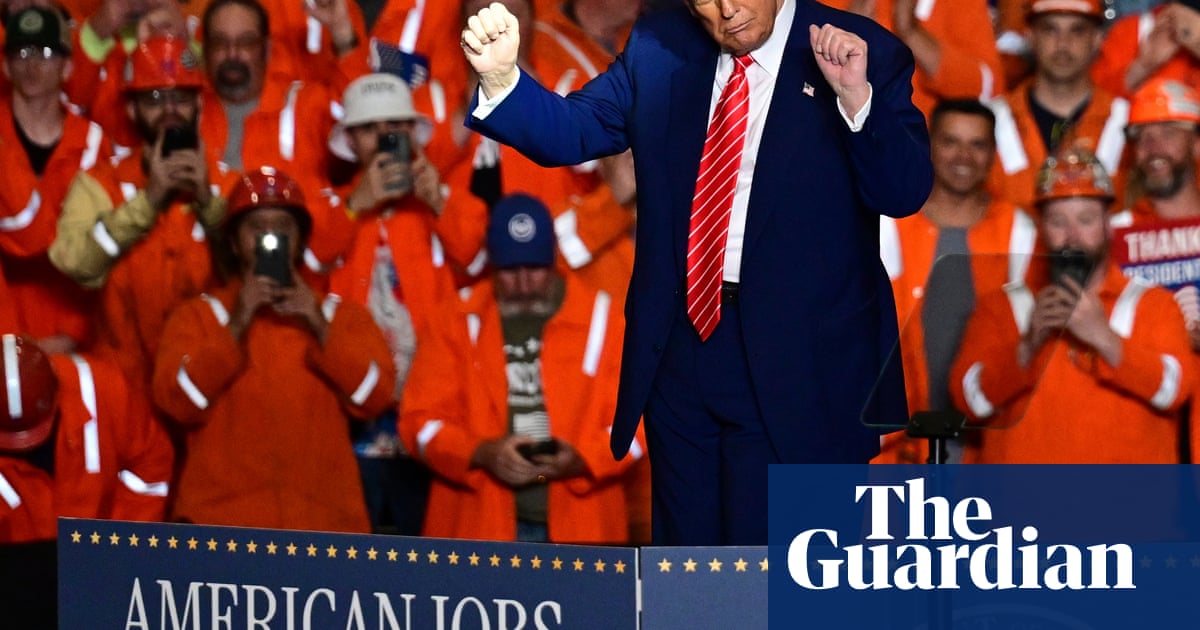Donald Trump said he was doubling tariffs on imported steel to 50% at a rally celebrating a “partnership” deal between US Steel and Japan-based Nippon Steel on Friday.
Speaking in front of an audience of steelworkers, the US president said: “We are going to be imposing a 25% increase. We’re going to bring it from 25% to 50%, the tariffs on steel into the United States of America, which will even further secure the steel industry in the United States.”
The surprise announcement, which contained no further detail, was cheered by the crowd at a US Steel plant in West Mifflin, Pennsylvania. Trump added: “Nobody is going to get around that.”
He spoke after US markets closed for the weekend. But the increase, set to take effect next week, is likely to create fresh economic turmoil.
Here are the key stories of the day:
The US president announced he was doubling foreign tariffs on steel imports to 50%, as he celebrated a “blockbuster” agreement for Japan-based Nippon Steel’s to invest in US Steel during a rally inPennsylvania.
Surrounded by men in orange hardhats,Donald Trumpunveiled the tariff rate increase as he spoke at a US Steel plant in West Mifflin, declaring that the dramatic hike would “even further secure” the US steel industry.
It was not immediately clear how the announcement would affect the trade deal with the UK,negotiated earlier this month, that saw tariffs on steel and aluminium from the UK reduced to zero.
Read the full story
The president sawElon Muskoff from the White House on Friday, as the Tesla chief concluded his more than four months leading the so-called department of government efficiency’s disruptive foray into federal departments that achieved far fewer cost savings than expected.
Standing alongside Trump in the Oval Office, Musk – who faced a 130-day limit in his tenure as a special government employee that hadended two days prior– vowed that his departure “is not the end” of Doge.
Read the full story
Elon Musk engaged in extensive drug consumption while serving as one of Trump’s closest advisers, takingketamineso frequently it caused bladder problems and travelling with a daily supply of about 20 pills, according to claims made to theNew York Times.
Read the full story
The president’s so-called Golden Dome missile defence program – which will feature space-based weapons to intercept strikes against the US – is not expected to be ready before the end of his term, despite his prediction that it would be completed within the next three years.
Read the full story
Donald Trumpsays he is firing the first female director of theNational Portrait Gallery, which contained a caption that referenced the attack on the US Capitol that his supporters carried out in early 2021.
Read the full story
TheTrump administrationhas ordered US consulates worldwide to conduct mandatory social media screening of every visa applicant seeking to travel toHarvard University, with officials instructed to view private accounts as potential signs of “evasiveness”.
Read the full story
TheUS supreme courton Friday announced it would allow theTrump administrationto revoke the temporary legal status of hundreds of thousands of Venezuelan, Cuban, Haitian and Nicaraguan migrants living in the US, bolstering the Republican president’s drive to step up deportations.
Read the full story
The state department is seeking to create an “Office of Remigration”aspart of a restructuring of the US diplomatic service to facilitate Trump’s rightwing anti-immigration policies.
The FBI is investigating an apparent impersonator who pretended to be the White House chief of staff, Susie Wiles,in texts and calls to her contacts, including prominentRepublicans.
Catching up?Here’s what happened on29 May 2025.
